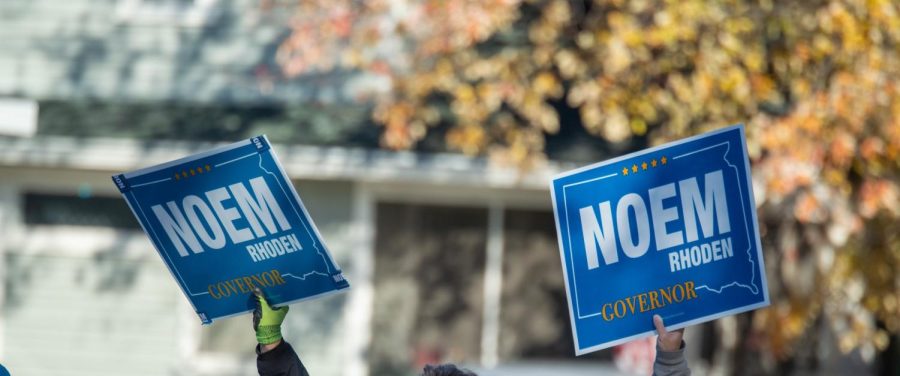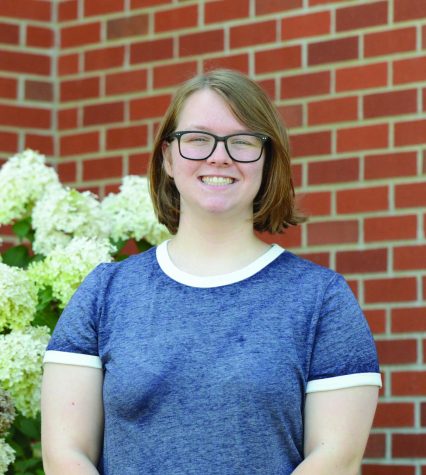What’s on the ballot: a guide to major elections, measures in South Dakota
November 1, 2022
South Dakotans have a chance to decide on several key issues Nov. 8, as well as vote for congressional and gubernatorial positions in our state. In preparation for Election Day, here is a guide breaking down who and what is on the ballot this year.
Amendments and Measures
Voters will be presented with two main ballot questions Nov. 8: Constitutional Amendment D and Initiated Measure 27.
Amendment D would expand Medicaid coverage in the state. This program typically covers children, low-income parents, caregivers and pregnant women, seniors in nursing homes and those with physical or developmental disabilities.
The amendment would increase the eligibility to anyone over 18 and under 65 whose income is at or below 133% of the federal poverty level, according to the amendment’s petition. For a single-person household, that would be anyone making $18,075 or less per year.
The SDSU Poll, a research unit of the university’s political science program, found that 53% of voters supported expanding Medicaid eligibility. Twenty-seven percent were still undecided. Women were also more likely to support Amendment D than men.
IM 27 would legalize the possession, use and distribution of recreational marijuana in the state for those 21 or older. The petition reads that “individuals may possess one ounce or less of marijuana. They may also distribute one ounce or less of marijuana without payment or other consideration.”
South Dakotans would also be able to grow their own marijuana plants in counties or cities where there are no licensed dispensaries or where allowed by county and city ordinances.
The SDSU Poll found that 45% of voters were in favor of legalizing recreational marijuana. Forty-seven percent were against the initiated measure and 8% were unsure.
“I was a little surprised about the softness of support for Initiated Measure 27,” said David Wiltse, political science professor at SDSU and director of the SDSU Poll. “We just passed something very similar in 2020 by a decent margin … and that dropped by quite a lot [in 2022].”
More registered Democrats are in favor of legalizing marijuana than registered Republicans.
Wiltse said that no matter voters’ opinions on these individual issues, it would have little effect on their voting of congressional and gubernatorial candidates.
“That really is the thing about politics and what political scientists have repeatedly found with voting behavior for the most part,” he said, “and you can find exceptions to this every once in a while, but for the most part our attitudes on policy are not driving our partisan choice.”
Congressional Elections
Sen. John Thune (R) and Brian Bengs (D) are the main candidates for the senatorial race.
For common topics of debate and issues of concern during this year’s election period, Thune, who has held the Senate seat since 2005, has taken the following stances during his campaign and according to his website:
- Does not support expanding Medicaid, but does support making health care more affordable
- Supports a ban on abortion
- Does not support legalizing recreational marijuana
- Does not support student loan forgiveness and said it will not fix tuition costs
Bengs, who has not held an elected office but served in the U.S. Army and Navy, has taken the following stances according to his website and during his campaign:
- Supports expanding Medicaid and allowing a choice between Medicaid and Medicare
- Does not support a ban on abortion
- Supports legalizing recreational marijuana
- Supports student loan forgiveness in a “lukewarm manner,” according to an interview with Hub City Radio, and said loan forgiveness will not solve the larger problem of student loan debt itself
The SDSU Poll showed 53% of voters preferred Thune over Bengs. Undecided voters made up 20% of the results.
The U.S. Representative seat is also up for grabs. Rep. Dusty Johnson (R) has held the seat since 2019. He has taken the following stances on his website and during his campaign:
- Supports ban on abortion
- Did not initially support recreational marijuana on the 2020 ballot. No information about his stance on IM 27 in 2022 could be found
- Does not support student loan forgiveness and co-led a bill to block President Joe Biden from canceling federal student loan payments “due to national emergency”
- No reliable information on Johnson’s stance on Medicaid could be found
Collin Duprel (L) is also in the running for the U.S. Representative seat. He has not held an elected position before. He has taken the following stances according to his website and campaigning:
- Does not support a ban on abortion
- Supports decriminalizing marijuana
- No reliable information on Duprel’s stance on Medicaid and student loan forgiveness could be found
The SDSU Poll did not include data on voter preference between Johnson and Duprel for the representative race.
Gubernatorial Election
Gov. Kristi Noem (R) and Rep. Jamie Smith (D) are the main candidates for the gubernatorial race.
Noem is running for her second term as governor after winning the 2018 election against Billie Sutton (D). Smith has served as a state representative since 2017.
Noem has taken the following stances according to her website and during her campaign:
- Does not support expanding Medicaid but said it will be supported if South Dakotans vote in favor of expanding its services
- Supports ban on abortion
- Does not support legalizing recreational marijuana but has said it will be supported if South Dakotans vote in favor of IM 27
- Does not support student loan forgiveness and said it will put more strain on taxpayers
The SDSU Poll showed 45% of voters were in favor of Noem for the gubernatorial race. Forty-one percent were in favor of Smith and 14% were unsure.
Women were more in favor of Smith, with 48% choosing him over Noem; meanwhile 52% of men supported the current governor.
Wiltse said that though the numbers predicted a close race, Noem is still favored to win the election because the undecided voters are more likely to break toward their own parties.
“When we broke it down between Democrats and Republicans, there are twice as many Republicans who are undecided as there are Democrats,” he said.
The polls are open Nov. 8 from 7 a.m. to 7 p.m. Voting centers in Brookings inculde Holy Life Tabernacle, the Activity Center and the Bethel Baptist Church.

























